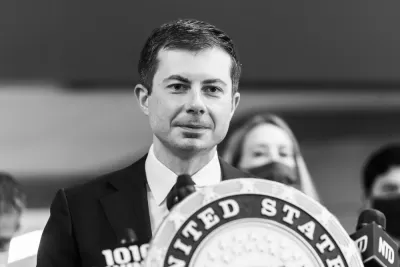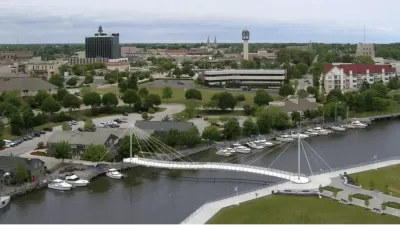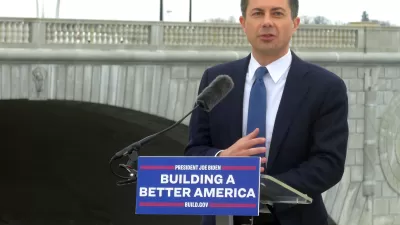Transportation Secretary Pete Buttigieg set off a social media frenzy by referencing an anecdote from "The Power Broker." While some didn't understand the reference, others repeated long-standing questions about the source.

By now you've probably seen the clip of Transportation Secretary Pete Buttigieg (in a video posted by the Twitter account of The Hill) referencing one of the most famous anecdotes from Robert Caro's The Power Broker as evidence of the racist intentions of planning and design decisions—a theme that Buttigieg has already spoken on repeatedly during his first year in the position. Here's the text of what Buttigieg said during a press conference about the new transportation funding available in the recently approved Infrastructure Investment and Jobs Act:
I’m still surprised that some people were surprised when I pointed to the fact that if a highway was built for the purpose of dividing a White and a Black neighborhood, or if an underpass was constructed such that a bus carrying mostly Black and Puerto Rican kids to a beach — or it would have been — in New York, was designed too low for it to pass by, that that obviously reflects racism that went into those design choices. I don’t think we have anything to lose by confronting that simple reality.”
Secretary Buttiegieg is, of course, referring to an anecdote in The Power Broker that tells a story about Robert Moses instructing project managers to lower bridge clearances on the Southern State Parkway near Jones Beach State Park to block the access of buses—potentially carrying the Black and Puerto Rican children mentioned by Buttigieg.
The pushback from the right side of the political aisle was swift, with Republicans such as Florida Gov. Ron DeSantis, Senator Ted Cruz (R-Texas), and hosts of the Fox News show "The Five" taking aim at the transportation secretary.
Many who have studied The Power Broker and know the history of racism in the planning programs of not just Robert Moses in New York, but all over the country, rushed to clarify the record. Philip Bump wrote for The Washington Post that the entire episode proved the need for a national discussion about institutionalized racism. Ellen McGirt wrote for Fortune [paywall] that Buttigieg understands the assignment of addressing racial inequity. Ahmed Baba wrote for Yahoo News that Buttigieg is right, and Senator Cruz and Tucker Carlson are wrong.
As noted in an article by Washington Post fact checker Glenn Kessler, however, many believe the anecdote from The Power Broker to be apocryphal. The footnotes from the book list the source for the anecdote as just one person, Sidney M. Shapiro, whom Kessler describes as a "close Moses associate and former chief engineer and general manager of the Long Island State Park Commission." The lack of double verification or written verification of Moses's instruction regarding the bridge have long contributed to a debate about the veracity of the claim. Kessler details the researchers who have attempted to verify the anecdote, finding reputable sources on either side of the issue.
To argue that the anecdote is apocryphal, Kessler cites Bernward Joerges, a German professor of sociology who examined the saga of the bridges in 1999. "In an essay, he acknowledged Moses was an 'undemocratic scoundrel' and a 'structural racist' but argues that all parkways at the time had low bridges," writes Kessler.
To argue that the anecdote is factual, Kessler cites the work of Thomas J. Campanella, a Cornell University historian of city planning and author the 2019 book Brooklyn: The Once and Future City. According to Kessler, Campanella "recorded clearances for 20 bridges, viaducts and overpasses on other parkways built at the time and compared them to measures of the 20 original bridges and overpasses on the Southern State Parkway. It turned out clearances are substantially lower on the Moses parkway."
While the veracity of this particular anecdote is subject to debate, the question of whether roads and highways have been designed with racist intentions is well established. Kessler seems to be implying that the existence of structural racism deserves more careful attention by those in positions of power, like Buttigieg: "Buttigieg should tailor his remarks to reflect what is historically unimpeachable — and we should be more careful to double-check on the latest views of historians. Even a Pulitzer Prize-winning book is not always the last word on a subject."
FULL STORY: Robert Moses and the saga of the racist parkway bridges

Trump Administration Could Effectively End Housing Voucher Program
Federal officials are eyeing major cuts to the Section 8 program that helps millions of low-income households pay rent.

Planetizen Federal Action Tracker
A weekly monitor of how Trump’s orders and actions are impacting planners and planning in America.

Ken Jennings Launches Transit Web Series
The Jeopardy champ wants you to ride public transit.

Opinion: Transit Agencies Must View Service Cuts as Last Resort
Reducing service could cripple transit systems by pushing more riders to consider car ownership, making future recovery even less certain.

‘Smart Surfaces’ Policy Guide Offers Advice for Building and Maintaining Urban Tree Canopies
Healthy, robust tree canopies can reduce the impacts of extreme heat and improve air quality.

New Jersey Lawsuit Targets Rent-Setting Algorithms
The state of New Jersey is taking legal action against landlords and companies that engage in what the state’s Attorney General alleges is illegal rent fixing.
Urban Design for Planners 1: Software Tools
This six-course series explores essential urban design concepts using open source software and equips planners with the tools they need to participate fully in the urban design process.
Planning for Universal Design
Learn the tools for implementing Universal Design in planning regulations.
Heyer Gruel & Associates PA
Ada County Highway District
Institute for Housing and Urban Development Studies (IHS)
City of Grandview
Harvard GSD Executive Education
Toledo-Lucas County Plan Commissions
Salt Lake City
NYU Wagner Graduate School of Public Service




























